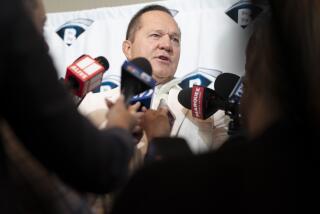No Progress Made in Key Strike Issues : Baseball: Rhetoric is familiar and discussions on the salary cap produce no movement. No meetings set for today.
- Share via
NEW YORK — Pitcher Mike Mussina of the Baltimore Orioles, one of the brightest lights in one of baseball’s brightest seasons, emerged Wednesday from what may have been the final attempt to avert a players’ strike Friday and said:
“I’m 95% certain there will be no games on Friday, and I’m sure it will last as long as there are no owners at these meetings. We’re not talking to owners. We’re talking to an owners’ representative who as far as I know will be the only one making money if there’s a strike.”
Both Richard Ravitch, the representative being paid $750,000 a year on a contract that expires in December, and Don Fehr, executive director of the players’ union, left the 2 1/2-hour negotiating session and indicated that Mussina’s 95% may be low.
“I see nothing of significance happening later today or anytime soon,” Fehr said. “There’s no sense in having a meeting just to have a meeting.”
Wednesday’s renewed discussions on the critical issue of a salary cap produced no progress or hint of a compromise.
No meeting is scheduled today, which could be the last day of the season.
Without a new collective bargaining agreement, a strike by the players is virtually certain to start Friday, possibly erasing the final 52 days of the regular season, along with the playoffs and the World Series.
Said Oriole pitcher Jim Poole, one of 11 players to attend Wednesday’s meeting at a Manhattan hotel: “We’re 48 hours away from shutting down the game, and Ravitch is giving us the same speech he gave us in March 1993. I’m not going to lie to you, it’s depressing.”
The rhetoric was familiar after the meeting, as well.
Ravitch spoke about the clubs’ need for a new compensation system that would produce cost certainty and slow the growth of salaries.
He said he regretted the union’s ongoing failure to respond to the owners’ salary-cap proposal, stressed the unanimity among owners, expressed doubt that he and Fehr would be able to resolve differences before Friday--”maybe lightning will strike one of us with an idea”--and said it is the fans who are hurt more by a strike than owners or players.
“A strike is not the end of the process but a midpoint,” he added. “We still have to sit down at some point and negotiate. We still have to sit down at some point and compromise.”
Fehr said the players will not accept a salary cap and that this is simply the final stages of a plan the owners put in place several months ago, forcing the players to wait 18 months for a proposal they knew the players wouldn’t accept and ultimately forcing the strike that the owners wanted in hopes of breaking the union.
“We could have shut down the game at the end of last season, but we gave up that leverage, thinking that another year would give us the needed time to negotiate,” Fehr said. “We acted in good faith and have been played for suckers by the owners. It’s a terrible shame that it’s come to this, but it’s not a fight of our making.”
Fehr said the real fight is between the big- and small-market clubs over how to distribute $1.8 billion in revenue, a fight they couldn’t resolve without linking their increased revenue sharing to a salary cap that forces the players to pay back any generosity by the big-market clubs.
He cited the owners’ actions during the stalemated negotiations, their recent withholding of a $7.8-million pension payment, Ravitch’s refusal to let owners attend the bargaining meetings, the absence of a commissioner, the restructuring report that “amounted to nothing” and the ongoing vacancies in the executive offices of the licensing department as examples of a monopoly in action.
“I’m amazed that the owners have acted so irresponsibly, but that’s what a cartel does,” Fehr said.
He also said the union offered the owners a series of proposals based on the research and recommendation of independent accounting firms, but these proposals were ignored.
“They weren’t responsive to the industry’s problems,” Ravitch said. “They didn’t transfer enough money to solve those problems.”
The strike figures to be costly to owners, players and others.
The Texas Rangers said they would reduce salaries of all 150 full-time employees by 10% if a strike lasts until Sept. 1 and by 15% after that.
The owners anticipate some of their biggest attendance dates during the September pennant stretch drive and have $140 million in TV revenue at stake during the postseason. They have no insurance, but still have a $260-million line of credit opened in 1992, from which some clubs have already borrowed.
The players have a $175-million-plus strike fund built from licensing revenue and will distribute checks on Sept. 15 and Sept. 29, normal paydays for the players. They estimate a loss of $5 million a day in salaries, but their biggest risk is the possibility that the owners will eventually declare an impasse and unilaterally implement their proposed new system.
Fehr said he wasn’t sure how the union would respond. None of the previous seven work stoppages since 1972 have gone that far.
* STRIKE IS CERTAIN: No more talks are scheduled, eliminating any chance for a settlement before Friday. A1
More to Read
Go beyond the scoreboard
Get the latest on L.A.'s teams in the daily Sports Report newsletter.
You may occasionally receive promotional content from the Los Angeles Times.










